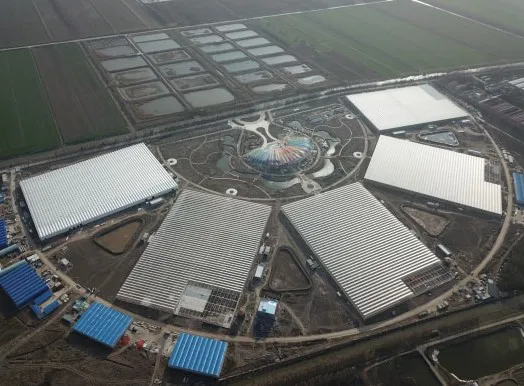Starting this month, FoodVentures from the Netherlands will oversee Shanghai's largest greenhouse for cultivating vegetables. On March 15, the first plants will be put in the greenhouse. In the coming years, tens of millions of tomatoes, cucumbers, heads of lettuce, and herbs will be cultivated here for residents of the Chinese metropolis.
 Aerial view Shanghai
Aerial view Shanghai
May 21 official first harvest
FoodVentures invests millions of euros in the project. The company from Everdingen already operates greenhouses in Georgia, Ukraine, and Kazakhstan. The first greenhouse in China is an hour's drive from Shanghai, in the Chongming District.
The greenhouse is 15 hectares (about 30 football fields) and consists of 5 different sections. On Friday, May 21 the first tomatoes and cucumbers will be harvested during the opening of the Flower Expo in Chongming.
Dutch authority
The greenhouses are owned by a Chinese real estate company. FoodVentures has signed a 25-year lease agreement with the Chinese investor and is responsible for the cultivation, marketing, and sale of the vegetables.
This is a business model that is almost non-existent in this industry. In the Netherlands, the owner of the greenhouse is usually also the grower. "As a Dutch company, we have full control over the way this greenhouse near Shanghai operates. Where we buy, what we cultivate, which people we hire and how we handle sales," says Dirk Aleven, founder and CEO of FoodVentures.
Fresh and safe vegetables
In China, demand for local, fresh and, above all, safely cultivated food has been increasing for years. The current pandemic has further increased this demand. Transport routes have partially stopped, which has made the import of vegetables more difficult. "The Chinese have not been able to achieve the same yield per square meter as we are used to in the Netherlands. Also, contaminated soil and water are regularly used during cultivation, which is not good for consumer confidence. In Shanghai, we cultivate according to Dutch standards. For example, we use substrate instead of soil, and we protect the crops with organic agents instead of unsafe chemicals," says Dirk.
Training Chinese growers
About 250 employees will start working in FoodVentures' first greenhouse in China. The management of the greenhouse currently only consists of people from the Netherlands. However, the intention is to locally train people to become growers, so that they can take over command in the long run. "We have tools to see what is happening remotely. We partly do this in our greenhouse in Kazakhstan", says Dirk.
The greenhouses in Shanghai are located in a large park. It is a place where residents regularly go to escape the hustle and bustle of the city. Here, the greenhouses are arranged like a floral fan around the visitor center. FoodVentures will also welcome tourists, especially Chinese tourists. According to Dirk, Chinese people want to know where their food comes from and how it is grown. The first buses are expected at the start of this month.
The desert calls
If it is up to FoodVentures, Shanghai is just the tip of the iceberg. The company wants to operate greenhouses in more Chinese cities. Within 5 years, they want to grow to an area of 100 hectares.
And China is not the only country the company is focusing on. There is also serious interest from the Middle East. Aleven: "We see a huge desire worldwide to be able to grow vegetables locally. Dutch greenhouse technology is in the spotlight. We believe that with our experience and tools, in combination with Dutch greenhouse technology, we can contribute a lot in a sustainable solution."
For more information:
FoodVentures
www.foodventures.eu
